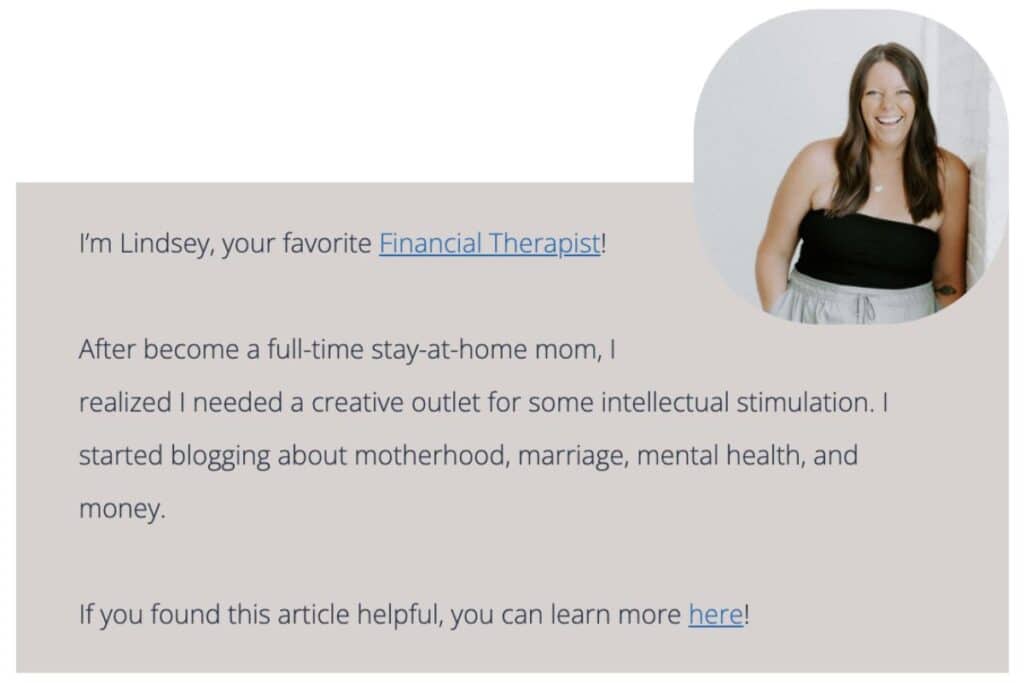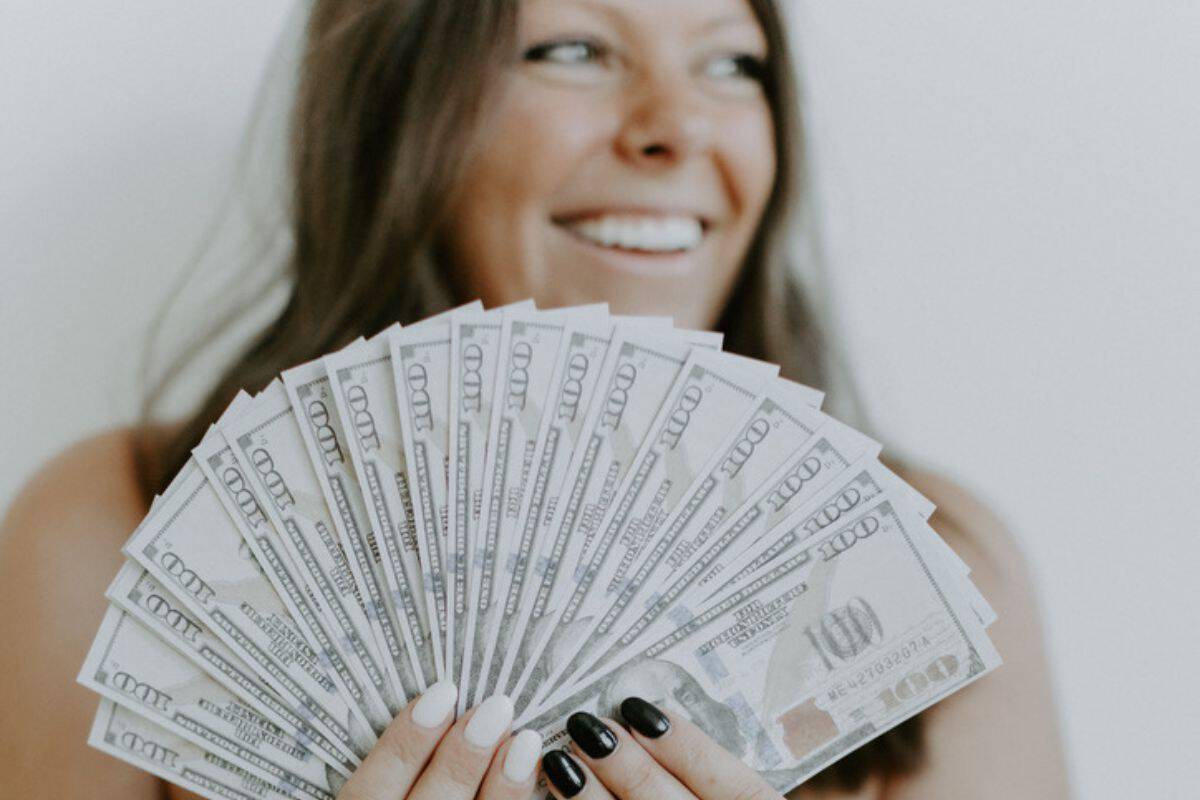Can Money Buy Happiness? A Financial Therapist’s Answer
Today, my friend, we are talking about the age-old question: Can money buy you happiness?
My answer might surprise you.
You can listen to the entire episode on Spotify, Apple Podcasts, or where ever you like to listen.
Can Money Buy Happiness? Public’s Answer
This is a topic that people have really, really strong feelings about. In fact, as I was putting together information about this episode, I put out a poll on Instagram asking, “Can money buy you happiness?”
One woman messaged me and said:
“Never. It can give you some more comfort and maybe ease your stress a bit, but never happiness! I know plenty of people who are loaded, but nothing ever seems enough to them and [they] are never fully happy!”
On the other side of the equation, I had responses like:
“Money can absolutely buy you happiness, but GREED causes problems.”
And another said, “Of course money can buy you happiness. Anyone who doesn’t think so is kidding themselves.”
Can Money Buy Happiness? Pop Culture’s Answer
And it’s not just people in my network. Money has been talked about in pop culture for centuries. Some examples include:
Biggie Smalls, the legendary rapper, had a huge hit in 1997 with the song, “Mo Money Mo Problems” with lyrics like: I don’t know what they want from me. It’s like the more money we come across, the more problems we see.”
Or, as I am a mom and constantly tuning in to Disney+, in the Disney movie, The Princess and the Frog, Princess Tiana and Prince Naveen are cursed with black magic by the Shadowman and turn into frogs.
In their desperate search to become human again, they go to Mama Odie, a voodoo priestess deep in the bayou, who sings about their troubles.
The lyrics read: Prince Froggy is a rich little boy. You want to be rich again? That ain’t gonna make you happy now. Did it make you happy then? No! Money ain’t got no soul. Money ain’t got no heart. All you need is some self-control.
However, Gene Simmons, the bassist for the famed rock band KISS, finds himself on the other side of the argument, going on record saying, “Money absolutely buys happiness.”
In his book, On Power: My Journey Through the Corridors of Power and How You Can Get More Power, he writes: “[…] yes, money will certainly increase your chances of making you, and those around you, healthier and happier.”
Simmons even went as far to reference the renowned psychological principle, Maslow’s hierarchy of needs, sharing the sentiment that if you don’t have money to cover your basic physiological needs like food, shelter, and clothing, there’s no chance of accomplishing things higher up on the pyramid like safety, love, esteem, and finally self-actualization.
I must say this is a rather deep viewpoint from a man who once went by “The Demon” for a stage name.
Can Money Buy Happiness? Why It Matters
All this to say, whether or not money can buy you happiness is clearly a point of debate among the population.
And all of this debating is fine and dandy, but I think we’re getting ahead of ourselves. I’m all for a healthy debate, but only if I know why it even matters.
For example, it’s fun to deliberate whether or not pineapple belongs on pizza (it does, by the way) or if said pizza should be cut into squares or triangles (of course, the answer is triangles). But those are really just for shits and gigs.
The question of ‘if money can buy you happiness or not’ has some substantiation, and even some negative repercussions if thought of in the wrong way.
If you believe Biggie Smalls’ claim that more money means more problems, then you agree that more money can’t buy you happiness because more problems certainly don’t make for a happier life. Right?
And in some ways, Biggie is actually totally on the mark here.
As a financial therapist, I’ve worked with clients that make $60,000 a year and I’ve worked with clients who are making well over $600,000 per year.
Interestingly, their problems have mostly been the same:
- Credit card debt
- Debt cycles (meaning getting out of consumer debt just to get right back in it a few months later and so on)
- Not having savings
- An inability to talk with their partner about money in a healthy and productive way
- Generally feeling incredibly stressed and overwhelmed by money
Typically, my clients earning higher salaries have just accumulated more debt, rarely have much in savings, still don’t feel connected to their partner, and feel stressed about money – their problems have effectively been amplified.
So, maybe it’s not more money, more problems. A more accurate rendition of the Notorious B-I-G’s song would be more money, same shit.
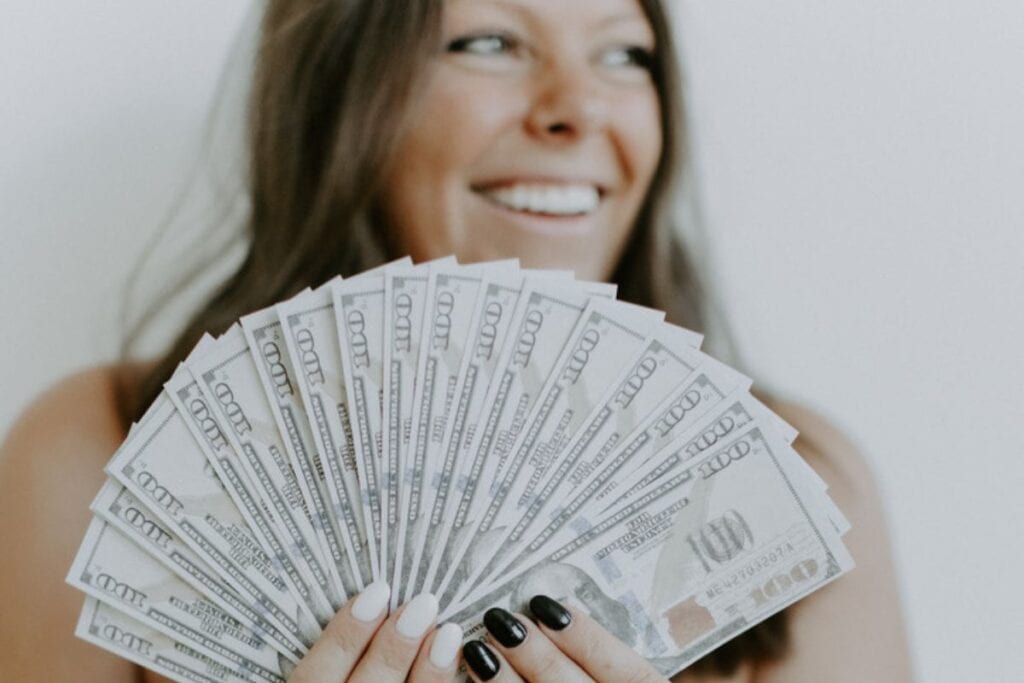
Can Money Buy Happiness? Examples
Now, I’m going to walk us through a couple scenarios, and as you’re reading, I want you to notice if you feel the difference between these two families.
The Green Family
The Green’s are a family of four, making $120,000 per year.
They currently have $20,000 worth of credit card debt, and would describe themselves as living paycheck-to-paycheck.
The Green’s can never get ahead, and money always feels tight.
They spend too much and have very little savings, if any, depending on the month.
One of the couple’s biggest arguments is about Amazon packages constantly showing up at their door. Yet, another day comes, another load of Prime packages are delivered, and another massive fight ensues.
Mr. and Ms. Green aren’t on the same page with money.
In the Green family, one person tends to avoid money conversations, while the other feels obligated to take on the brunt of managing the family’s money.
Even things that should be fun, like planning a family vacation, aren’t because any conversation involving money nearly always ends in an argument.
The Greens think that when they earn more money, they’ll be happier. But when Mr. Green gets a new job with a $20,000 salary increase, things seem to be the same.
Somehow, despite earning $140,000 per year, money still feels tight. They still aren’t on the same page with money. They still don’t have healthy, productive conversations about money, and they’re still fighting about those damn Amazon packages.
The Amber Family
Now our second family is the Amber Family. And much to your surprise – I’m sure – they also are a family of four and earn $120,000 per year (what a coinkydink).
They don’t have any credit card debt, and money feels… dare I say, comfortable?
They have simple systems in place and generally know where their money is going. And if an unexpected expense or opportunity comes up, they have a quick money date and chat about it.
Mr. and Ms. Amber are intentional with their money. That’s why they love dreaming up and planning their next vacation. It’s exciting to think of where they can go next!
And when Mr. Amber gets a new job with a $20,000 salary increase, the couple is pumped! For them, it means having a fun conversation about what to do with more than 1,000 extra bucks per month!
They’ll likely put a hefty chunk towards retirement savings and up their travel game on their next vacation with a boujee AirBnb. They’ve also been patiently saving to re-do the deck on their house, and this will speed up the process quite a bit.
Okay, now, given the differences in the two scenarios, the latter sounds undoubtedly better to me. The question is did the money do that or did the approach do that?
Can Money Buy Happiness? Habits vs. Amount
And the answer is (drum roll please)…
Both.
Both the family’s habits and the amount of money they earn play a contributing factor in how happy they are.
And because I’m a financial therapist, and we like to get all up in the feels over here, we’re going to talk about behaviors and habits first.
Can Money Buy Happiness? The Hedonic Treadmill
I want to introduce you to a concept called the Hedonic Treadmill, because the Green family – and most Americans – are riding this thing with vigor.
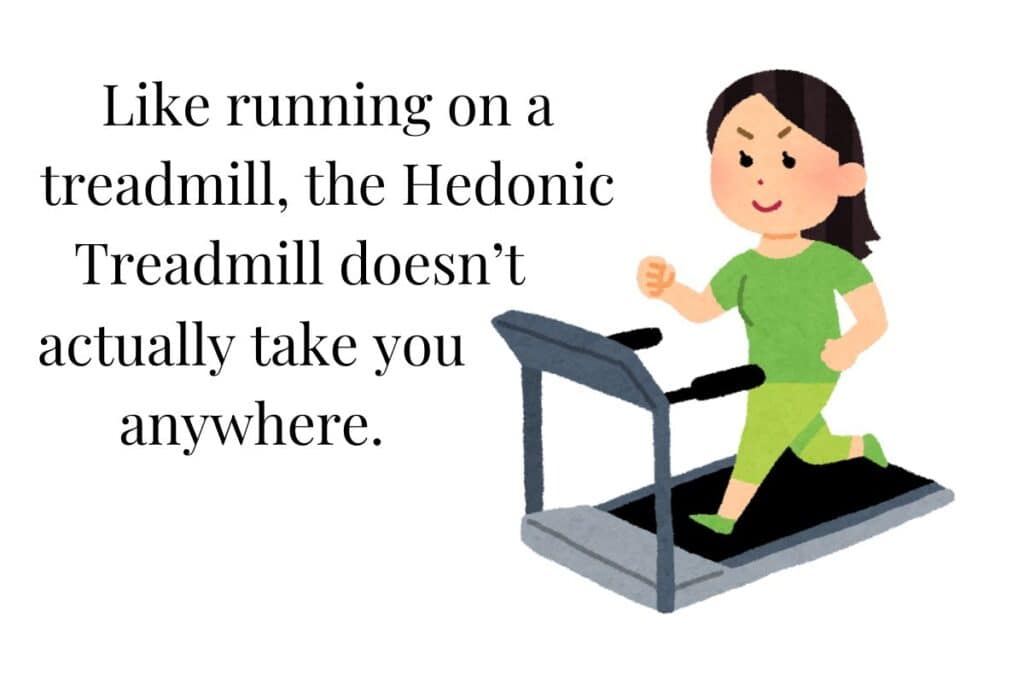
What is the Hedonic Treadmill?
A Psychology Today article defined the Hedonic Treadmill as:
“[. . .] the idea that an individual’s level of happiness, after rising or falling in response to positive or negative life events, ultimately tends to move back toward where it was prior to these experiences.”
In other words, you have a baseline of happiness. And even after big events – positive or negative – occur, your happiness level return to their baseline.
The article goes on to explain that most individuals’ baseline of wellbeing – also known as their set point – is generally in the positive zone of emotions. Then, when you do something like start a new romance, have a bump of cocaine, or – yes – spend money, they experience a burst of joy.
Think about any new relationship you’ve been in. Dates were thrilling. And every time he texted you and you saw his name pop up on your phone, your stomach filled with little butterflies of excitement.
But after a flirty text conversation, your mood returns to baseline. This is the Hedonic Treadmill in action.
In the book Quit Like a Millionaire, Kristy Shein gives a shout out to cocaine because there is a plethora of research on how drugs like cocaine impact our brain’s reward system, yet far less research on the brain’s reward system as it relates to finances.
She talks about how The Hedonic Treadmill is also responsible for the drug-user term “chasing your first high.”
If you’re unfamiliar with the concept, the idea is pretty simple. When a person does their first line of cocaine, their pleasure centers are overstimulated and jolted. They get a huge spike of a high.
But next Friday night, when they do their next line of coke, the high isn’t as strong. They need more cocaine to reach the same high as that initial hit.
The same response can be had when spending money.
The Hedonic Treadmill Examples
The first time a woman purchases a Louis Vuitton handbag, her reward system lights up. She’s enamored with the bag for weeks, making sure it never feels disrespected.
Time goes on and her feelings toward the bag might still be generally positive, but her day-to-day happiness isn’t really affected by the purchase anymore.
And while she loves that Louis, it’s really a winter bag, and she’d love to have a Louis Vuitton for the summer months, too.
She buys her second Louis Vuitton handbag. She’s excited about it for sure, but this time doesn’t hit quite like the first.
I’ll give you another example:
You probably don’t remember your first Amazon Prime purchase. If you do, please email me. I’d love to hear your experience.
But the Hedonic Treadmill can explain why you’re so addicted to getting packages delivered to your door.
Think about the process from start to finish.
You’re overworked and overtired, and you just want a little reprieve.
After putting the kids to bed, you grab your glass of wine and cozy up on the couch. Phone in hand, your thumbs drift to Instagram. Time to mindlessly scroll. Sweet relaxation.
You get about 8 double taps in when you see your old college friend wearing a super cute matching set. And it reminds you, you’ve been wanting a new set, too. Plus, it’s fall now and you need some warmer clothes (Nevermind the 86 pairs of leggings you already have upstairs in your closet).
Your thumbs make their way to the Amazon app.
And 10-minutes later, you’ve not only found your new matching set, but a couple great fall outfits for the kids, and you threw in a journal for yourself, too. Those damn suggested items are always right on the money.
The shiny yellow button at the bottom of the screen speaks to you – 1-click to buy. And you happily oblige. And, boom! A rush of dopamine is sent coursing through your body.
Two days later the packages arrive, and to be honest, you kind of forgot you even ordered them. But yay! It’s like a mini Christmas Day. Who doesn’t love presents? More dopamine comes searing through.
The matching set is cute. Maybe not the exact color you thought it was going to be, but you’re happy with it regardless. You put it on. It’s pretty cute. It’s comfy. What more does a girl need?
And a week later, just like a druggie needing the next bump of cocaine on a Friday night, you need another hit of dopamine. Back to Amazon you go.
This is why Amazon Prime is so addicting. This is why Jeff Bezos is so rich. The company knows how your reward system works.
The reality is, no matter how much stuff you buy – no matter how many packages you get delivered to your door – you can’t buy your way into a permanent state of happiness.
The Hedonic Treadmill won’t let you, because you always return to your baseline level of happiness.
The Hedonic Treadmill: The Exception
There is one very interesting exception to the Hedonic Treadmill. And that is how you spend your money.
You see, unlike buying random stuff from Amazon or Target or Ulta or TJMaxx, buying things like experiences do bring you lasting joy.
Experiences have what I called the triple-pleasure effect. The triple-pleasure effect is:
You get to feel joy when planning the thing, you get to feel joy when doing the thing, and you get to feel joy when remembering the thing.
When my husband and I were planning our wedding, we – like most couples – had Bachelor and Bachelorette parties.
My bestie planned the BEST Bach party for me. However, that’s not what this story is about.
It actually happened when my husband came home one day and told me he wanted his Bach party at our house for a weekend. He’s the biggest homebody I know, so this is totally on brand for him.
He said the guys would go to a shooting range, play video games, and hit up the local bars. And he asked if I could find somewhere else to stay for a couple nights.
I did as he requested. Like most supportive soon-to-be wives do, I texted my friend to see if she wanted to… take a 10-day trip to Europe.
I mean he did say to find somewhere else to be for a couple nights…
My friend was totally on board. We talked about a budget for the trip and agreed that hostels were not going to be on the itinerary.
I told her I would plan 3 epic vacation options and she could choose which one we go on.
This is phase one of the triple-pleasure effect in the works. Planning something like a vacation – creating the anticipation for seeing a historic castle in Germany, hiking the Alps, or riding a gondola through the waterways of Venice – gives you a burst of energy.
Phase two – actually going to Germany, Austria, and Italy – is the part everyone thinks is the most fun. And don’t get me wrong, being there is friggin’ great. But it’s only one-third of the triple-pleasure effect.

Because in phase three, the remembering phase, you can’t minimize the merriment I feel in my soul every time I think about wandering around Burano and eating the best risotto I’ve ever had in my life.
And this is why The Amber family from our example is so happy, too.
How Money Buys Happiness
But, let’s be honest, there’s another piece to the equation for The Amber family.
Yes, they have healthy money habits and they know how to spend their money to maximize joy. But they actually have money.
Of course, how the couples approach their money is vitally important for the longevity of their happiness. But the actual dollar amount absolutely plays a role in these scenarios.
The Amber family certainly has a far better attitude and habits with their money than the Green family, but they wouldn’t be as happy in their lives if their salary was $50,000 per year.
They like to travel. They like to stay in nice accommodations and do cool shit in new places. That brings them pleasure and delight. And that couldn’t happen if they weren’t making a healthy wage.
The three biggest differences between the Amber family and the Green family is that the Green Family has debt, they don’t know how to talk about money, and they buy stuff rather than time together.
If you remember, even when the Green’s got a $20,000 salary increase, they didn’t prioritize getting out of debt. They didn’t learn how to talk about money together. And they were still buying a bunch of crap online. They just amplified the stressors they already had in their lives.
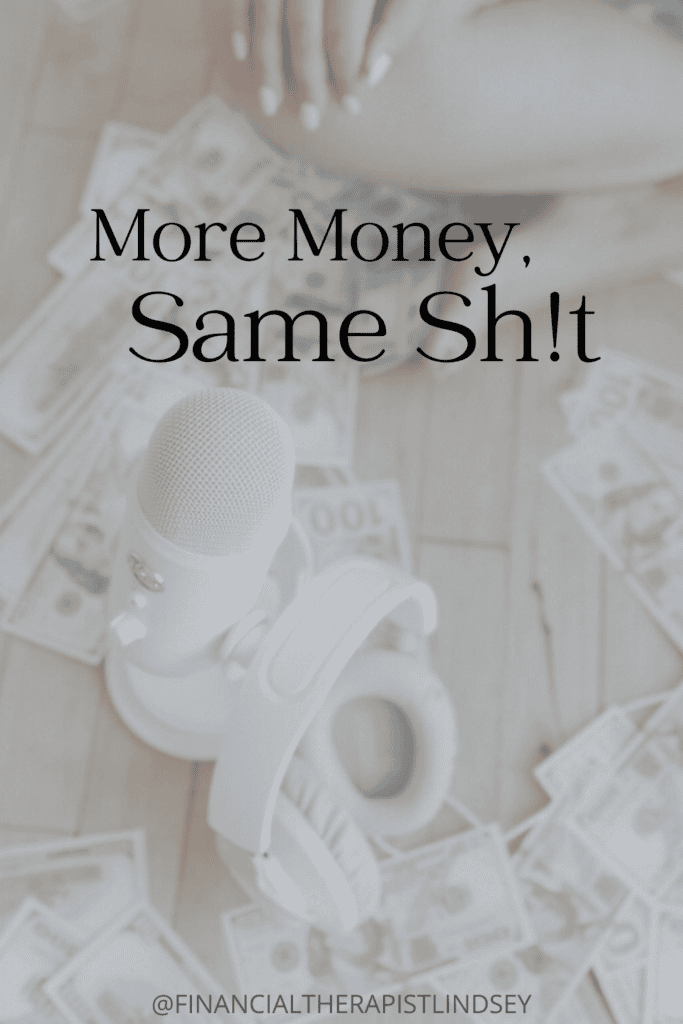
Now, there’s a book that I highly recommend called Your Money or Your Life. The authors Vicki Robin and Joe Dominguez used to host finance seminars.
In those seminars, Vicki Robin would do a bunch of activities with the participants. During one of those activities, she would ask attendees two questions:
- How much they earned
- How much they thought they needed to earn to be happy
On average, people of all incomes – those making $30,000 or those making $100,000 – would say the same thing: They needed to make double their current salary in order to be happy.
This is very telling.
It means that no matter how much you make, you assume more money will solve your problems. But the truth is, more money, same shit.
It’s not about what you’ll do with the money you eventually get. It’s what you’re choosing to do with your money now.
In the context of the Green family, those habits suck. But in the context of the Amber family, those habits rock.
The Amber family isn’t stuck in the debt cycle. They have a plan for their money. And they know how to spend money on things that bring them lasting joy. Plus, they do it all by being on the same team and being partners in the dynamic.
Unless the Green’s make a concerted effort to change, their money habits – staying in debt, having no savings, not talking about money, and buying dumb shit – will inflate right alongside their salary.
Turns out, I didn’t know I’d have so much with Gene Simmons, but the guy’s got a point. The Greens aren’t capable of reaching their full potential in their current financial state.
And ultimately, my answer to the question: Can money Buy Happiness is YES – with the caveat that you MUST have a healthy relationship with money first. Otherwise, you’ll spend your life in the more money, same shit cycle for life.
Next read: How to Make a TIME Budget in 2025
